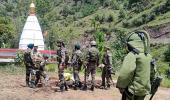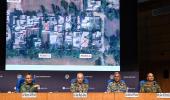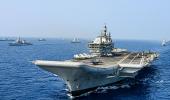'I'm not accepting the 'any act of terrorism is an act of war' threshold.'
'I don't think this is sustainable because if you do this four or five times in a short duration, it will lose its edge.'

The US-mediated ceasefire that followed Operation Sindoor has ignited sharp concerns about a possible shift in India's strategic posture -- particularly its consistent rejection of third-party involvement in the Kashmir dispute.
In this interview with Prasanna D Zore/Rediff, Dr Ajai Sahni, Executive Director, Institute for Conflict Management and one of India's leading counter-terrorism experts, calls the development a "definitive disadvantage" for India, arguing that the ceasefire announced by Donald Trump, without India or Pakistan present, undermines the spirit of the 1972 Simla Agreement, which firmly placed Kashmir as a bilateral issue.
Pakistan, he notes, has always sought to internationalise the conflict, and the optics of the ceasefire provide it with a diplomatic win.
More worryingly, he suggests India's decision may have been shaped less by military assessment than by political compulsions or the inability to resist US pressure.
The ceasefire, he says, "opened a door" for external mediation but that door can still be shut, provided India acts with clarity, coherence, and a strong reaffirmation of its long-standing strategic principles.
The first of a two-part interview.
Looking at the strategic aftermath of the US-mediated ceasefire, who do you believe won and who lost from this ceasefire?
As far as the ceasefire alone is concerned, I think this has put India at a significant disadvantage because the Indian position has always been that there will be no third-party intervention. This was what we had embedded in the Simla Agreement as well.
Pakistan has always sought to internationalise the issue and bring in outsiders.
Apart from that, Donald Trump has over the years made several statements which suggest that he is interested in a (mediatory) role in the Kashmir conflict. I think this is a very definitive disadvantage or loss as far as India is concerned.
How it will play out will depend, of course, on how India continues to respond to Trump's assertions and to demands for mediated talks. But at this juncture, at one stroke, I think we have lost something.
Given that India had a military upper hand in this skirmish with Pakistan since May 6-7, why do you think India would have agreed to a ceasefire and what military or strategic objectives did Operation Sindoor achieve?
I don't think this is the result of a military assessment of victory or advantage. I think this is essentially an issue that relates to political imperatives and perhaps the inability of the leadership to stand up to the United States.
We don't know the circumstances of what has happened. All I can say, as I said before, is that we have accepted something that has compromised (India's) long-standing positions.
Why we have done it is a matter of detail that is certainly not accessible to me and is likely not going to ever be accessible.
Does US intervention in brokering the ceasefire undermine the 1972 Simla Agreement ban on third-party mediation?
Absolutely. That is something I've already said -- it is a definite dilution of the Simla Agreement.
Pakistan has been welcoming of Trump's statements on the US-brokered ceasefire as it always wanted to internationalise the Kashmir dispute. What does this episode mean for India's future stance on third-party involvement on Kashmir?
I don't think it has any necessary bearing. It has opened the door, but the door can be shut. As I said before, it depends on how India continues to conduct itself from here on.
First of all, please understand, whatever Donald Trump's assertions, India has still rejected the idea that it was a mediated ceasefire. Exactly what happened behind the scenes, we don't know.
But officially India says there was no such intervention or mediation. This was something that was arrived at through a conversation between the directors general of military operations (DGMOs of India and Pakistan).
So first of all, the denial itself tells you that the long-term Indian position is going to continue to be that there is no outside agreement. But the whole point that the ceasefire actually commences not after an announcement by India and Pakistan or by India or Pakistan, but an announcement without either India or Pakistan in attendance by Donald Trump himself is something that I think is unfortunate from the Indian perspective.
Do you foresee any operational impact of Operation Sindoor on militant groups now operating from Pakistan, given your view that strikes lack real deterrent effect?
I believe that there will be operational adaptations. Principally, this entire enterprise (the terrorist ecosystem spawned by Pakistan) is going to be driven deeper underground. The degree of openness with which these elements have functioned in Pakistan will have to be diluted.
You will see their leaderships less located in clearly identified headquarters, moving about constantly, moving about secretly. Because you see, Operation Sindoor was carried out after almost two weeks of declarations that ‘this is coming, this is coming.’
Next time around, it doesn't even have to be in the wake of a terrorist attack. If a location of a top terrorist leader is known, a strike can be inflicted without warning.
As a potential target, I (high-value terrorists and their hideouts that India wants to eliminate) will be concerned by this. My headquarters, my camps have been hit already. Next time around they may be hit when I'm sitting there. So the terrorist hideouts, the terrorist masterminds will always be under this fear.
There is going to be an apprehension at the back of my mind that not only the leaders but also the cadres are likely to be, can be possibly hit. So I think there will have to be tactical and operational adaptations to that.

What are the most tangible gains that India made through Operation Sindoor?
Well, I think first of all, the real gains or lack thereof will only be proven when we see Pakistan's conduct, at least over the medium term, if not the long term.
What we can say is that India has demonstrated its will to cross lines that have never been crossed before and has clearly communicated to Pakistan that it will respond disproportionately to future transgressions if these are beyond a certain threshold.
I'm not accepting the 'any act of terrorism is an act of war' threshold. I don't think this is sustainable because if you do this four or five times in a short duration, it will lose its edge.
It will cause enormous international damage to India. It will cause enormous domestic damage, because war or even these short skirmishes of this nature are deeply disruptive of economies and the wider national system.
So this is not something where only the defence forces will respond. A nation of 150 crore responds differently. It has affected our lives. It has affected your lives. It has affected so many people on the ground.
People die. You have to, at some point of time, ask yourself a question: 26 people died in the (Pahalgam) terrorist attack. How many people have died on the Indian side in (in Pakistan's shelling along the LoC) Operation Sindoor, including larger number of civilians who were killed in the original attack (in Pahalgam)?
All these costs have also to be taken into consideration. These are not arguments that we can never fight, we must never have war.
At some point in time, war may be thrust on you and then you will have to fight. And you can't keep on making arithmetical calculations of people who died. But I believe if you fail to explore a wide range of other instrumentalities of response, that would be a great strategic error.










